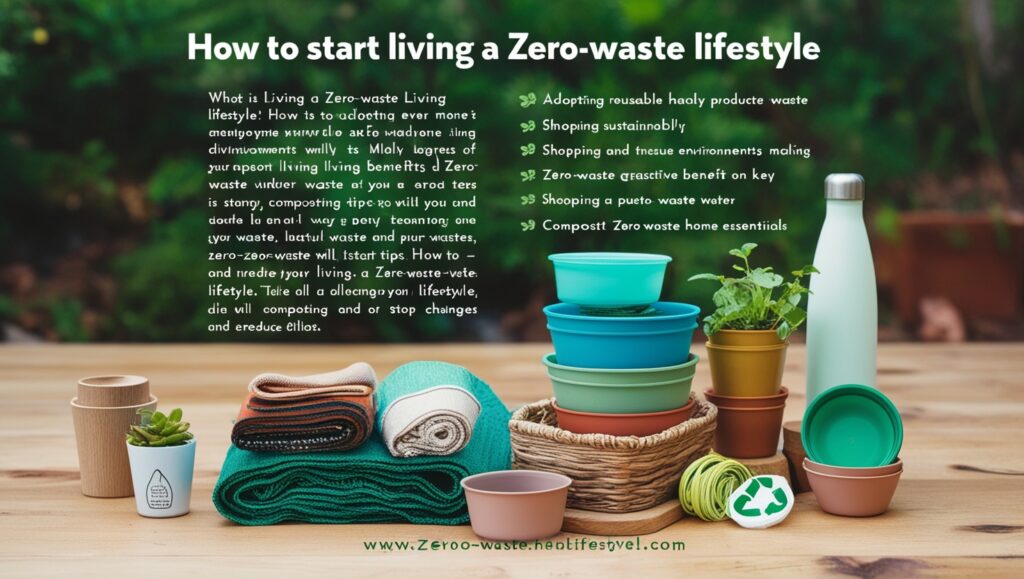How to Start Living a Zero Waste Lifestyle
Living a zero-waste lifestyle is an empowering journey toward sustainability, with the goal of minimizing waste and reducing our environmental footprint. This lifestyle centers on adopting habits that prioritize reusability and recycling, all while minimizing waste generation. Whether you’re starting small or going all-in, transitioning to a zero-waste lifestyle can make a significant impact on the planet and inspire others to do the same. Here, we’ll explore actionable steps, helpful tips, and essential practices to guide you on this sustainable path.
1. What is a Zero-Waste Lifestyle?
A zero-waste lifestyle aims to divert as much waste as possible from landfills and incinerators. It emphasizes the “5 R’s” principle:
- Refuse: Say no to items you don’t need.
- Reduce: Limit your consumption and use only what’s necessary.
- Reuse: Opt for reusable items over single-use ones.
- Recycle: Properly sort and recycle items that can’t be refused, reduced, or reused.
- Rot: Compost organic waste.
The main objective is to rethink our consumption habits and transition to practices that generate minimal to no waste.
2. Benefits of Living a Zero-Waste Lifestyle
- Environmental Impact: Reduces pollution and conserves natural resources by minimizing waste.
- Economic Savings: Investing in reusable products and reducing consumption can save money in the long run.
- Health Benefits: Encourages the use of natural and eco-friendly products that are often healthier.
- Community Influence: Inspires others to adopt similar practices, leading to a larger positive impact on the environment.
3. Steps to Start Your Zero-Waste Journey
a. Start with a Waste Audit
A waste audit helps you understand your current consumption and waste patterns. Collect your household trash for a week and sort it into categories (e.g., paper, plastic, food scraps, etc.). Identify which items could be eliminated, reused, or replaced with sustainable alternatives.
b. Adopt Reusable Basics
- Reusable Shopping Bags: Replace plastic bags with fabric totes or string bags.
- Water Bottles and Coffee Cups: Invest in stainless steel or glass bottles and cups.
- Cloth Napkins and Towels: Swap out paper towels for reusable cloths.
- Mason Jars and Containers: Use glass jars for food storage, leftovers, and even as drinking glasses.
c. Shop More Sustainably
- Buy in Bulk: Visit stores that offer bulk sections where you can bring your own containers for grains, nuts, and spices.
- Choose Minimal Packaging: Opt for items with little to no packaging or packaging made of recyclable materials.
- Support Local and Ethical Brands: Buying from local vendors or ethical brands reduces carbon emissions and supports sustainable practices.
d. Composting 101
Composting is a key component of the zero-waste lifestyle, as it helps convert food scraps and yard waste into nutrient-rich soil. Here’s how to start:
- Choose a Compost Bin: Pick a compost bin that suits your living space, whether it’s a backyard bin or a countertop composting system.
- Layer Your Compost: Alternate layers of greens (fruit scraps, vegetable peels, coffee grounds) with browns (leaves, cardboard, newspaper).
- Turn and Maintain: Regularly aerate your compost to accelerate the breakdown process.
e. DIY Alternatives
Creating your own products reduces waste and reliance on plastic packaging. Here are a few DIY ideas:
- Homemade Cleaners: Combine vinegar, water, and essential oils to create an all-purpose cleaner.
- Personal Care Products: Make simple products like deodorants, toothpaste, and face masks using natural ingredients.
- Reusable Beeswax Wraps: Replace plastic wrap with beeswax wraps by infusing cotton cloths with beeswax, tree resin, and jojoba oil.
4. Common Challenges and How to Overcome Them
Challenge 1: Accessibility and Initial Costs
Solution: Start with small changes and work within your budget. Over time, reusable items pay for themselves through repeated use.
Challenge 2: Finding Sustainable Stores
Solution: Research zero-waste and bulk stores in your area. Many cities have small markets or co-ops that prioritize sustainable practices.
Challenge 3: Breaking Habits
Solution: Implement one change at a time. For instance, switch to reusable bags for a month before moving on to another habit, such as composting or switching to bamboo toothbrushes.
5. Tips for Maintaining a Zero-Waste Lifestyle
- Plan Meals and Shop with a List: Reduce food waste by planning meals and buying only what you need.
- Host Swaps and Second-Hand Finds: Organize clothing and item swaps with friends to refresh your wardrobe or household items without waste.
- Repair Before Replacing: Learn basic sewing or fixing techniques to repair items instead of discarding them.
- Educate and Advocate: Share your journey with friends, family, or through social media to inspire a community of change.
6. Zero-Waste Home Essentials
To help you transition more smoothly, here’s a list of essential zero-waste items for your home:
- Reusable Straws: Stainless steel or bamboo straws.
- Eco-Friendly Utensils: Bamboo or stainless-steel cutlery.
- Cloth Produce Bags: Lightweight bags for fruits and vegetables.
- Reusable Silicone Food Bags: Replace disposable ziplock bags with durable silicone versions.
- Sustainable Cleaning Cloths: Microfiber or cotton cloths that can be washed and reused.
7. The Impact of Your Efforts
Transitioning to a zero-waste lifestyle is a process that takes time, but every step counts. By adopting even a few practices outlined here, you contribute to reducing the demand for disposable products and create a ripple effect of environmental awareness. Collectively, these efforts can lead to decreased landfill waste, lower carbon emissions, and a healthier planet for future generations.
Final Thoughts
Starting a zero-waste lifestyle may seem challenging at first, but with small, consistent changes, it becomes a rewarding and impactful journey. By being mindful of consumption, choosing reusable and recyclable products, and composting organic waste, you can lead a life that aligns with your commitment to sustainability. Embrace the process and celebrate each step toward a more eco-conscious life.

